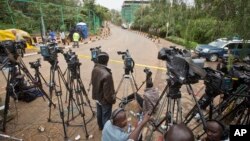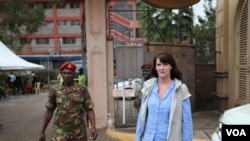NAIROBI —
Coming to relieve my colleague, camped near a shopping mall in Kenya’s capital Nairobi on Sunday evening, 30 hours after attackers started a siege, I felt like it could be a wasted trip or I’d be in bed within hours after the last hostages had been released.
An entire night awake, listening for any traces of gunfire and trying to find out if anyone else had escaped from the mall bore no fruit. Around 5 a.m., the only sound permeating the eerie silence was birds singing.
But as dawn broke, the cheerful chirping gave way to heavy gunfire, as around a dozen journalists readying to finish the “graveyard shift” had to lie down for 15 minutes to escape possible flying shrapnel.
Kept about 200 meters from the mall by a heavy security presence, it was impossible to tell where the firing was coming from, as the volleys seemed to reverberate around the tall buildings obscuring our view.
After such a long wait and a siege that had already left around 60 people dead by then -- some sprayed with bullets as they tried to escape and others executed -- we all hoped that this was the final push.
The Kenyan military had been promising the siege was in the “final stages” and they were “in control” of most of the building the night before, although soldiers had admitted that no one wanted to go in after dark for fear of snipers.
But as the gunshots died down, and as the crouching journalists scrambled to inform the world, three large blasts went off.
Surrounded by military and police but with no one saying anything, journalists could not help but speculate whether gunmen purportedly representing Somali militant group al-Shabab were lobbing grenades, or perhaps had blown up the mall and themselves with it.
Throughout the day, sporadic gunfire broke out, peppered by explosions, as journalists shook their heads and lamented the government misinformation that has marred this crisis, and the lack of access that has prevented proper reporting.
As a turf war between press and military over where journalists could stand and a ban on any photos or even pre-positioned TV cameras raised tensions among two strung-out and exhausted sides trying to do their jobs, shout of “clear, clear!” came from the gate and press ran and scrambled for cover.
Apparently security forces had spotted potential attackers possibly holding explosives -- just one example of the tense but murky situation facing Kenya right now as an unknown number of attackers sow terror in the heart of a city.
On Monday afternoon, dark plumes of smoke started billowing out of the shopping mall, as sirens screeched around us. The fire painted a dark stain across the sky and grey mist floated our way as thoughts went to possible surviving shoppers hiding for two days in the dark.
Attempts to find a higher vantage point were fruitless, as construction site owners or security guards turned journalists away from buildings or tried to charge extortionate amounts.
On the streets, everything was frenetic, from the taxi-van “matatus” careering around corners, or pumped up youths shouting and pacing towards the mall, to the trigger-happy police tear-gassing crowds -- and the journalists standing next to them.
As night fell and the explosions came as frequently as the official claims that all was under control, many journalists slumped off to bed -- anxious to miss out on the end of this but unable to fight fatigue any longer.
But on Tuesday morning, far from the statements on Twitter claiming the siege was over, gunfire and explosions again greeted me near the mall.
Sniffer dogs gave one the sense that security forces could be clearing the mall of booby-traps, but the arrival of fresh portable toilets countered police assurances that it would all be over within hours.
After so many government claims -- most relayed through Twitter and countered by al-Shabab's changing accounts that are routinely shut down -- the siege is over three days old.
Around 60 people are still missing and the same number killed, with an unknown number of assailants and victims still alive in the mall.
What is clear is that only when this crisis is truly over will we know even half of the story. What it means for Kenya, long considered a regional and international hub for expatriates and wealthy Africans who frequented Westgate shopping mall, also remains to be seen.
For sure, these attackers and attackers have grabbed the world’s attention and front-page headlines, casting themselves in a bad action movie that everyone is forced to watch.
And for many Kenyans -- the hundreds still waiting word on missing loved ones -- the horrible feeling is not knowing when this tragedy will end.
An entire night awake, listening for any traces of gunfire and trying to find out if anyone else had escaped from the mall bore no fruit. Around 5 a.m., the only sound permeating the eerie silence was birds singing.
But as dawn broke, the cheerful chirping gave way to heavy gunfire, as around a dozen journalists readying to finish the “graveyard shift” had to lie down for 15 minutes to escape possible flying shrapnel.
Kept about 200 meters from the mall by a heavy security presence, it was impossible to tell where the firing was coming from, as the volleys seemed to reverberate around the tall buildings obscuring our view.
After such a long wait and a siege that had already left around 60 people dead by then -- some sprayed with bullets as they tried to escape and others executed -- we all hoped that this was the final push.
The Kenyan military had been promising the siege was in the “final stages” and they were “in control” of most of the building the night before, although soldiers had admitted that no one wanted to go in after dark for fear of snipers.
But as the gunshots died down, and as the crouching journalists scrambled to inform the world, three large blasts went off.
Surrounded by military and police but with no one saying anything, journalists could not help but speculate whether gunmen purportedly representing Somali militant group al-Shabab were lobbing grenades, or perhaps had blown up the mall and themselves with it.
Throughout the day, sporadic gunfire broke out, peppered by explosions, as journalists shook their heads and lamented the government misinformation that has marred this crisis, and the lack of access that has prevented proper reporting.
As a turf war between press and military over where journalists could stand and a ban on any photos or even pre-positioned TV cameras raised tensions among two strung-out and exhausted sides trying to do their jobs, shout of “clear, clear!” came from the gate and press ran and scrambled for cover.
Apparently security forces had spotted potential attackers possibly holding explosives -- just one example of the tense but murky situation facing Kenya right now as an unknown number of attackers sow terror in the heart of a city.
On Monday afternoon, dark plumes of smoke started billowing out of the shopping mall, as sirens screeched around us. The fire painted a dark stain across the sky and grey mist floated our way as thoughts went to possible surviving shoppers hiding for two days in the dark.
Attempts to find a higher vantage point were fruitless, as construction site owners or security guards turned journalists away from buildings or tried to charge extortionate amounts.
On the streets, everything was frenetic, from the taxi-van “matatus” careering around corners, or pumped up youths shouting and pacing towards the mall, to the trigger-happy police tear-gassing crowds -- and the journalists standing next to them.
As night fell and the explosions came as frequently as the official claims that all was under control, many journalists slumped off to bed -- anxious to miss out on the end of this but unable to fight fatigue any longer.
But on Tuesday morning, far from the statements on Twitter claiming the siege was over, gunfire and explosions again greeted me near the mall.
Sniffer dogs gave one the sense that security forces could be clearing the mall of booby-traps, but the arrival of fresh portable toilets countered police assurances that it would all be over within hours.
After so many government claims -- most relayed through Twitter and countered by al-Shabab's changing accounts that are routinely shut down -- the siege is over three days old.
Around 60 people are still missing and the same number killed, with an unknown number of assailants and victims still alive in the mall.
What is clear is that only when this crisis is truly over will we know even half of the story. What it means for Kenya, long considered a regional and international hub for expatriates and wealthy Africans who frequented Westgate shopping mall, also remains to be seen.
For sure, these attackers and attackers have grabbed the world’s attention and front-page headlines, casting themselves in a bad action movie that everyone is forced to watch.
And for many Kenyans -- the hundreds still waiting word on missing loved ones -- the horrible feeling is not knowing when this tragedy will end.

